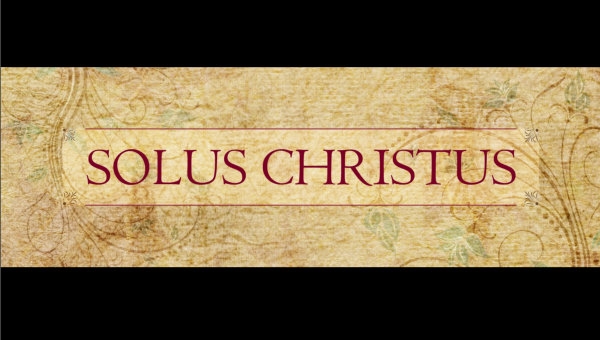By Tyson Thorne

Last week we started a series on the “five solas” of the Reformation period, and today we finish up and we’ve saved the best (if one can classify such things) for last: Solus Christus, or Christ alone. This theological principle is expressed as: Christ alone is the mediator between man and God and salvation is found in no one else. This was a direct response to the Catholic church who taught that man must confess to a priest, and the priest would mediate between God and man. In fact, the Catholic system at the time resembled the Jewish system of the first century.
“Let it be known to all of you and to all the people of Israel that by the name of Jesus Christ the Nazarene whom you crucified, whom God raised from the dead, this man stands before you healthy. This Jesus is the stone that was rejected by you, the builders, that has become the cornerstone. And there is salvation in no one else, for there is no other name under heaven given among people by which we must be saved.” – Peter, Acts 4.10-12
There are several points to consider before one can accept the precept of solus Christus. The first of them is that man cannot do enough to save himself. Once we have sinned, we can never again be worthy of God’s presence. This is why priests cannot mediate between other men and God, for they themselves are fallen creatures. It is why no amount of good works can ever “make up” for our failure. It is also why animal sacrifice only covered one’s sin – it never resulted in righteousness.
The second point is that Jesus never sinned. Only perfection could mediate between imperfection and God. Whereas animal sacrifice covered sin, only the perfect sacrifice of Christ can result in the forgiveness of sin. If Jesus had sinned there would be no forgiveness of sins, and no salvation of humankind. But we know that he was perfect because after his sacrificial death, Christ was also resurrected – the first (and so far only) person to be such.
The third point follows the second, because Christ alone lived the human life perfectly, the only one able to die for our sins, and the only one resurrected he is also the only one who can save us from our sins. A man I worked for years ago once told me, “I believe all religions lead to God.” It is a common sentiment among polite people, but however widely held it is still wrong. “That’s interesting,” I replied, “I’ve found that most religions are man’s attempts at reaching out to God and that Christianity is unique among them all as it is God reaching out to man.” When God reached out, he did so through Christ alone. Martin Luther put it this way:
"I must listen to the gospel. It tells me not what I must do, but what Jesus Christ the Son of God has done for me." - Martin Luther
And so we have journeyed through the five solas of the Reformation. We see clearly from the Scriptures alone how we are saved by grace alone, through faith alone in Christ alone and how this points to why glory belongs to God alone.
|
|